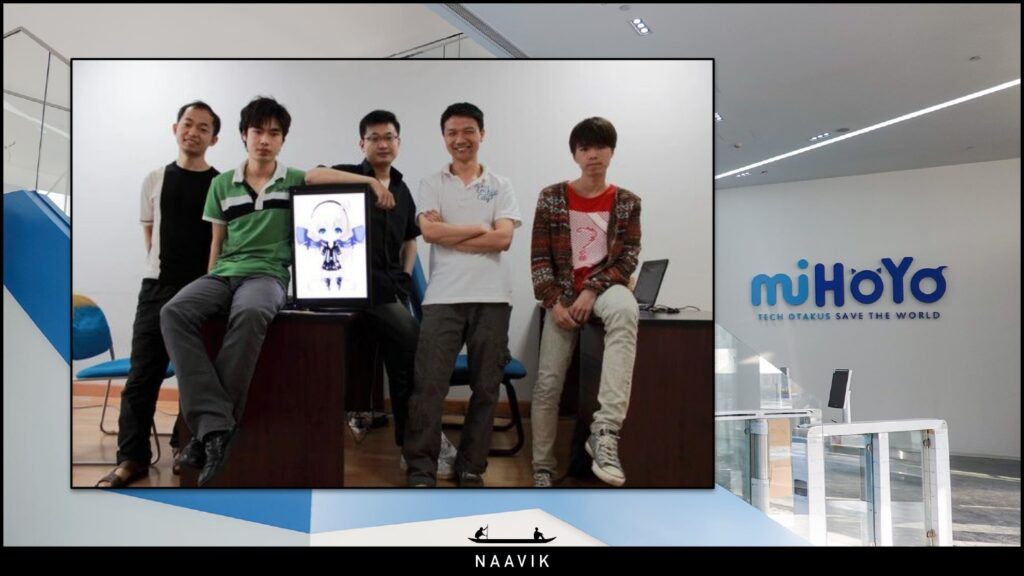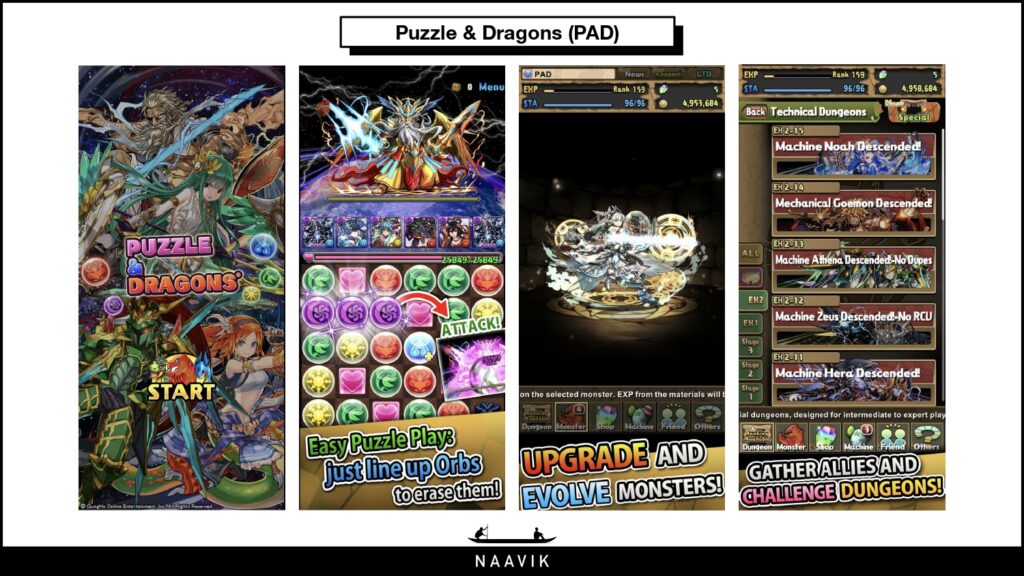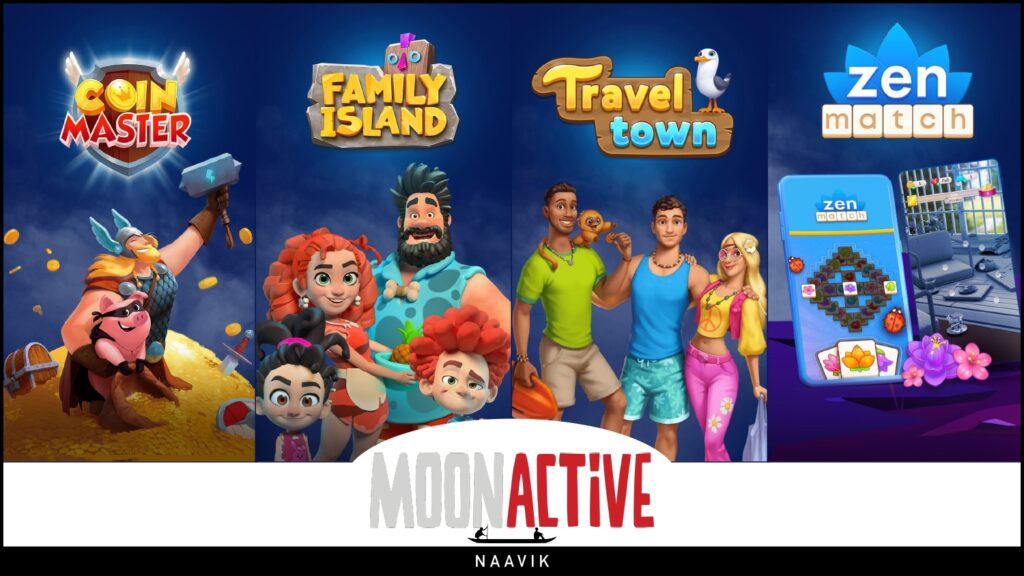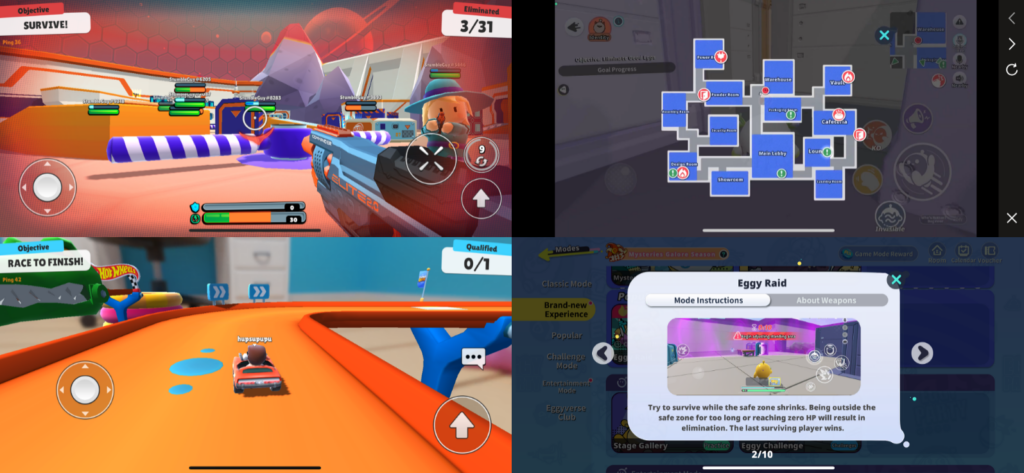Get Inspired: The Humble Beginnings of miHoYo!
By Harshal Karvande, Naavik Contributor & Game Design Lead at Rovio

We recently deconstructed miHoYo’s second billion dollar game, Honkai: Star Rail, here on Naavik (and before that, Genshin Impact). But one thing we didn’t cover is the company’s journey from dorm room to multi-billion dollar powerhouse.
In 2011, three friends studying computer science at Shanghai Jiao Tong university with a love of anime, manga, and games (ACG) came together to start a new game studio in their student dorm. Zoom forward to 2023 and the three founders — Cai Haoyu, Liu Wei, and Luo Yuhao — have released seven games and entered New Fortune’s 500 Rich List with their net worths around $7.6B, $4.2B, and $4B respectively. This is the story of miHoYo, from dorm room startup to one of the world’s most successful gaming companies.
Cai, Liu, and Luo shared an interest in technology and the three worked on several tech projects together including an open-source literature community and an isometric tile-based game engine, which each won them prizes. Combining their passion for tech and ACG, the three self-identified as otakus. Hence the company name and mission, miHoYo: Tech Otakus Save The World.

Initially the company was going to be named HoYo after two of the three founders, with the ‘H’ and ‘Y’ for Cal Haoyu and Luo Yuhao, and the ‘oo’ inspired by Facebook, Google and Microsoft. But HoYo was already registered so they added the ‘mi’ from virtual idol Hatsune Miku, a tribute to her popularity among ACG audiences and otakus.
Otaku is a neutral term in China, and refers to committed fans of tech and ACG. miHoYo’s tagline, ‘Tech Otakus Save The World’, captures the founding team’s interest in tech and ACG, and the second part (‘Save The World’) celebrates the achievement of geeks.
“Let’s make a game we want to play!”

miHoYo made its first game as an unofficial company working out of their dorm. FlyMe2theMoon is a puzzle-platformer inspired by the anime Neon Genesis Evangelion’s ending theme song, also titled Fly Me to the Moon. It launched in September 2011 as a paid game and wasn’t a financial success, though it had great tech in its physics engine and a strong ACG, moe aesthetic in its main character.
Liu has recounted the challenging period after the first game was a bust: “In the end, you would still choose to continue doing this, so when I talk about passion, it's not just empty words. It's something that your body honestly feels. The more you do the work you love, the more you are moved by it, and the more you are able to accept challenges and face difficult times.”
The game’s failure prompted the team to search for an investor, which led to its only outside funding, CNY 1m (150K USD) from Hangzhou Skye Network Technology for a 15% stake. The rest of the shares are owned by the three founders, with Cai, Liu, and Luo owning 41%, 22.6%, and 21.4% respectively.

For its first game as a ‘real’ company, miHoYo took inspiration from side-scrolling shooter Zombie Town and the anime-manga series Highschool of the Dead. Zombiegal Kawaii was released in December 2012 as a paid game with microtransactions, but by February 2013 switched to F2P with IAPs. By the time Zombiegal Kawaii launched, the team had almost exhausted its investment in the game’s R&D and marketing.
Cai has said of the game: “There was not much thought in the details. We wanted to make a game we want to play, so we did it. We discovered that the top-ranking games in the App Store didn't have the types of games we wanted to play, so we made our own. The reason is that simple.”
Though the team learned a lot from the experience and gathered customer data while operating the game, it was not that successful, with 1.98M lifetime downloads and $303K total revenue. It was a tough time for the company, and though the team still wanted to continue making the ACG action games they wanted to play, they identified that their approach lacked the detail and progression depth of other successful F2P games. One game that miHoYo looked at was Puzzle & Dragons (PAD), a puzzle RPG with gacha hero collection.

PAD was the first mobile game to hit $1B in revenue and has become one of the highest grossing mobile games of all time, with $8.5B+ lifetime revenue. miHoYo spent six months in R&D mode essentially copying PAD’s progression & gacha monetization systems and adopting it for its next action game, Zombiegal Kawaii 2 a.k.a. Guns Girl Z.

The launch of Zombiegal Kawaii 2 (ZK2) in Jun 2023 was a pivotal moment for miHoYo. The team, which by then had grown to six, had a breakout hit that was generating $1.4M per month. By essentially copying PAD’s sophisticated progression systems, miHoYo translated PAD’s collectable and upgradable dragons into ZK2’s guns and clothing. PAD had single-handedly popularized gacha monetization in F2P mobile games, and a large part of miHoYo’s success can be attributed to studying and implementing its mechanics.

And the rest, as they say, is history. The success of ZK2 proved to miHoYo that there was a sizable audience for ACG moe games: players develop strong connections with the characters and their stories, which unlocks the monetization potential. For the team’s next game, Honkai Impact 3rd (Genshin Impact’s precursor), miHoYo achieved x10 the scale of ZK2 by doubling down on the proven ACG moe gacha model while pushing technical boundaries. Higher budgets, larger teams, and more time in R&D created a cross-platform technical marvel.
The F2P gaming market has seen seismic shifts in the 12 years since miHoYo started out as three friends in a student dorm. Their pursuit of making games for other ACG moe fans like them, while excelling in their technical craft, will be hard (but not impossible) for other developers to follow – some have tried, with growing numbers of miHoYo-like games out there. What is harder still to duplicate is the discipline of the team to clearly identify and solve for the details they were lacking.

Integrate safe UGC into your game with CurseForge For Studios
Overwolf is an all-in-one platform that lets creators build, share, and monetize in-game apps, mods, and private servers. With over 165,000 creators, and 38 million monthly active users, Overwolf supports the world’s most popular AAA titles such as League of Legends, Minecraft, World of Warcraft, and 1,500 other games.
For game developers, Overwolf offers CurseForge For Studios. CurseForge For Studios is a white-label solution that lets game makers and publishers easily integrate mods safely and seamlessly into their games, both existing and new, at zero cost. It’s battle-tested by AAA studios and games, including Maxis (The Sims™ 4), Studio Wildcard (ARK), TakeTwo Interactive (KSP), and others.
CurseForge For Studios offers:
- Cross-Platform Modding: Integrate Overwolf’s open-source SDKs and plugins to let players discover and install mods in-game, across all platforms and storefronts.
- Full Analytics Dashboard: Get a full modding usage dashboard to learn which mods are popular.
- Safe and Secure Moderation: Studios define policies and guidelines on what is permitted, and these are then enforced by Overwolf - with only authorized content being published.
- Creator Relations and Payments: CurseForge supports creators with monthly payments, equity investments, developer contests, and hackathons to get their creative juices flowing, and kickstart content creation for your game.
Gaming Market Update: September 16th – 22nd

- For the week ending September 22nd, 2023: The average return for gaming companies tracked by Naavik with a market capitalization exceeding $500M was -4.0%. The S&P 500 returned -2.9% and the Nasdaq-100 returned -3.3%. Full access to the Naavik Gaming Company universe is available here.
- Unity (NYSE: U) led the gaming sector decline last week, falling 13% as the company announced controversial pricing changes. Ultimately, the company apologized for making such drastic changes without soliciting community feedback, rolling back most of them and introducing a 2.5% gross revenue fee cap. For more details, you can read our coverage on Unity’s pricing changes here.
Notable Venture Financing Deals

- Proof of Play secured $33M in seed funding to advance its on-chain RPG Pirate Nation. The round was co-led by a16z and Greenoaks Capital. The game enables players to construct ships, hire crews, and engage in battles to compete for a top spot on the leaderboards. Initially, Pirate Nation was deployed on Polygon, but switched to Ethereum scaling network Arbitrum Nova this March to reduce network fees. Concurrent with the round, the game also introduced its free-to-play mode, which does not require a “Founder’s Pirate” NFT to access. According to OpenSea on September 24th, the cheapest Founder’s Pirate was listed at 0.09 ETH ($143), and the highest was 3.5 ETH ($5,573).
- Proof of Play's ultimate vision is to construct a "Forever Game", a decentralized platform where players control the experience, eliminating the need for external servers or creator interference. The studio aims to open-source its technological infrastructure, enabling developers to create on-chain games using its platform. Twitch co-founder and former CEO Emmett Shear will be joining the board, having stepped down from the streaming service earlier this year.
- Indian live chat room and social gaming app Eloelo raised $22M in its pre-Series B round. This brings total funding to $37.5M, and follows its $13M Series A round in June 2022. Founded in 2020, Eloelo is a live social gaming platform that allows creators to host games and connect with their audience. The capital will support collaborations with content creators, development of AI and AR tools, recruitment of tech talent, and the buildout of new revenue and monetization strategies. Eloelo is only available on the Google Play store but is one of the top three apps in India in the entertainment category, with over 37M users and 120,000 content creators. Saurabh Pandey, CEO and founder of Eloelo, says the platform’s engagement has grown 400% year-over-year. It is available in six languages and the team aims to add more in the coming months, targeting Tier 2 and Tier 3 cities in the country.
- Spectarium, a new remote-first game developer from Finland, raised $5.3M in seed funding. The round was led by BITKRAFT, with participation from Delphi Digital and Framework Ventures. The studio will use the funding to further build its team and develop its first game, Myths, an action RPG that gives each player a unique experience through the use of AI. The game is a boss-focused dungeon crawler, and the team includes developers and designers from EA, Epic, Riot, and Square Enix. Myths is expected to soft launch in 2024.
- Wicked Saints Studios raised $3.5M in its seed round, following a $1.1M pre-seed round in November 2021. Its first game World Reborn is described as a cross between Riot‘s Arcane animated series and Pokémon GO. The game will combine mixed reality with real-life quests, and has a social activism element where players are rewarded for actions like picking up trash. Wicked Saints expects to launch the game in 2025.
Notable Strategic Investments

- Roblox acquired Finnish start-up Speechly for an undisclosed amount. Speechly was founded in 2016 and focuses on speech recognition and natural language processing. It raised a €2M seed round in 2019, and was part of Y Combinator’s Winter Batch in 2022. Its solutions include speech recognition for real-time, cost-efficient voice moderation, relevant to Roblox since it introduced voice chat in 2021. Speechly says it is also the first voice AI tool to introduce a financially viable way to moderate AR/VR and metaverse experiences.
- The way Speechly’s voice moderation works is by processing in-game audio live and flagging bits of speech with abuse labels. Each label is then assigned a score, with a different threshold for being flagged as problematic. Speechly claims it can process voice with a better accuracy, recall, and false positive rate for words that matter than competing solutions.
- For Roblox, this acquisition makes a lot of sense, and solving this problem has grown popular. In August 2021, Unity acquired AI chat analysis platform Oto, which weighs the tone and emotional weight of words in addition to what was actually said. This April, Activision partnered with Modulate to use its AI voice moderation system ToxMod. Then in July, Xbox launched a new voice reporting feature which lets gamers capture in-game voice incidents and send them to the Xbox Safety Team. Given Roblox’s voice chat targets a demographic aged 13+, these tools are even more important to help ease the scrutiny it is under around player safety.
Featured Jobs
- MoneyPlant AI: Founding Engineer (Pune, India)
- Zedge: Mid/Senior UX Designer (Vilnius, Lithuania)
- FunPlus: Lead Game Designer (Barcelona, Spain)
- FunPlus: Senior Game Artist (Barcelona, Spain)
- FunPlus: Senior Game Developer-- Unity (Barcelona, Spain)
You can view our entire job board — all of the open roles, as well as the ability to post new roles — below. We've made the job board free for a limited period, so as to help the industry during this period of layoffs. Every job post garners ~50K impressions over the 45-day time period.








